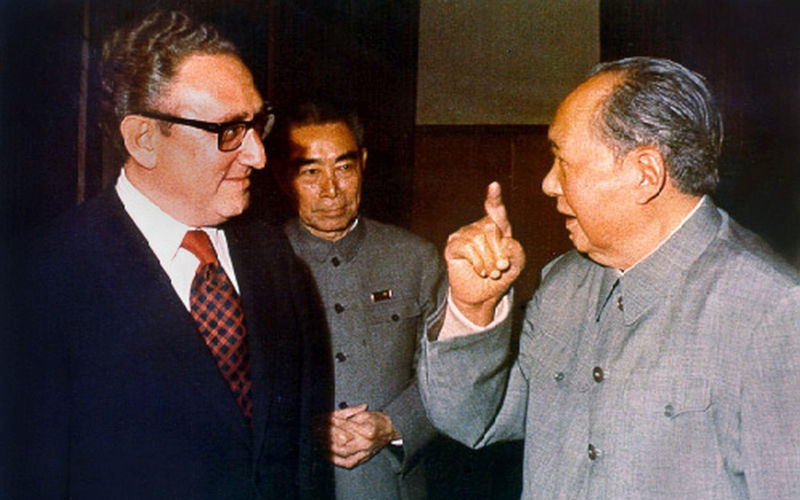Sino-US normalisation: the real legacy of the late Henry Kissinger
December 11, 2023
Henry Kissinger’s role in expediting the Sino-US normalization and recognition process represented one of the greatest feats in modern diplomatic history_._
The Australian’s conflicted 2-3 December 2023 obituary of Henry Kissinger came under the banner-head, “Flawed Giant of Realpolitik”. Although we are never to see his like again, many in the Western media have left Kissinger to languish in Purgatory’s jammed carpark. They have portrayed him, as a charming, but unfeeling realist, who, while sucking on the root of power as “the ultimate aphrodisiac”, allegedly committed war crimes in South America and Southeast Asia. However, his reputation in China still remains high. On arriving at the Fengdu Portal’s “Exit for the Living and the Entry for the Dead”, King Yanluo would have personally vouched for China’s reliable “old friend” and gladly escorted him across the “Golden Bridge” to the heavenly palaces of Western Paradise.
Likely neither side is ever in full possession of the complete truth, but Kissinger’s role in expediting the Sino-US normalization and recognition process represented one of the greatest feats in modern diplomatic history; and this success needs to be fully explored as it is crucially relevant to the correction of contemporary misunderstandings between China and the West.
At the 2014 International Conference of Zhou Enlai Studies at Nankai University, Tianjin, the author turned to an explanation in a paper on how, in the early 1970s, Kissinger and Zhou Enlai had managed to scale mountains of difficulties to craft the formal basis of Sino-US normalisation. Comparing the underlying dialectics of policy realism and idealism, that paper then considered a fortuitous cross fertilisation of Chinese “praxis” with Kissinger’s reserved “pragmatism”.
There is an old Chinese saying, “To change after realising one’s own faults is to be a sage.”
At Harvard Kissinger had clung to the stark Cold War Weberian distinction between “charismatic leadership” and liberal democratic “rational-legal authority”. Once in Beijing, in 1971-72, the good Doctor had an epiphany. He changed his mind and even acknowledged Zhou as his “teacher”. China was no longer “a brooding, chaotic, fanatical and alien realm.” “China was in the great classical tradition of European statesmanship”, Zhou and Mao Zedong were “artists of relativity” and “scientists of equilibrium”.
Nixon and Kissinger agreed to proceed not on the basis of ideology, but with respect to mutual interests. They admired and endorsed Zhou Enlai’s “seeking common ground while reserving differences.” Kissinger complemented Zhou’s “capacity to intuit the intangibles of the psychology of the opposite number.” Although neither side had “any illusion of changing the basic convictions of the other” for the national benefits of regional and international peace they were ready to “reserve differences” as suggested in the Chinese operational notion, “seek common ground while reserving differences.” The two sides would concentrate on mutual interests while reserving ideology and differences of state system. Objective reality would be respected while “common aspirations” could coexist with “different viewpoints”.
This comfortable coincidence of interests, however, was not predicated in a mandated identical structure of thought, anchored in the same cultural understanding and society. Diversity was not only to be respected, but eulogised. Chinese “praxis” overlapped with Kissinger’s modified “realism”. It called for deft response to change, that comes with careful adaptation to changing domestic and international as “internal relations” of objective social reality.
Mao originally defined the key notion of “seeking the truth from the facts”: “Facts are all things which exist objectively; ‘truth’ means their internal relations…and ‘to seek’ means to study.” This notion underwrote the necessity of adapting to changing circumstances, that included opposition to “hegemony” in international relation, but changing political alignments were preferred to strict formal alliance agreements. There were times when Kissinger seemed to be aiming for an alliance with the Chinese against the Soviets, but he realised that such pressure threatened the course of negotiations and the anti-hegemony clause in the Shanghai Communique was ultimately cast more as a generic problem, rather than a specific, targeting of the USSR.
Kissinger’s insights were best captured in his book, On China where he asks, “Is pragmatism enough?” If he were still among us, Dr. Kissinger as the “Flawed Great Giant” would break the very bonds of death to scatter his six-inch Lilliputian critics for their chattering fake “realism”. Pragmatism, “empty of vision”, however, could not ensure world order; and the history of US foreign policy could not be understood without considering the importance of “American exceptionalism” as the practice and propagation of freedom. While order is important, it co-exists with values. In his book, Diplomacy, 1994, Kissinger had summed up the American foreign policy tradition as a fateful synthesis of Theordore Roosevelt’s impious frontier realism with Woodrow Wilson’s universal idealism.
As for the Chinese, Kissinger frankly accepted that the Chinese tendency to “universalism” was less problematic than in the American case as the latter too freely deploys power expediting the exclusive expansion of American values throughout the world. Kissinger put on his historian’s hat, pronouncing on Chinese values and interests to conclude: “The principle that Chinese international conduct was based on norms transcending power went back to Confucius.” In On China, 2011, the good doctor prescribed “co-evolution” so that the US and China would pursue their “domestic imperatives, cooperating where possible, and adjusting their relations to minimise conflict. Neither side endorses all the aims of the other or presumes a total identity of interests, but both sides seek to identify and develop complementary interests.”
“Realpolitik” is not the answer. As Kissinger benignly looks down us from the Buddha’s Western Paradise, hopefully Anthony Albanese’s new emphasis on “cooperating where we can, while disagreeing where we must” will be similarly grounded in the “golden-mean” thinking and diplomacy that so successfully synthesized realism and idealism in the early 1970s.
